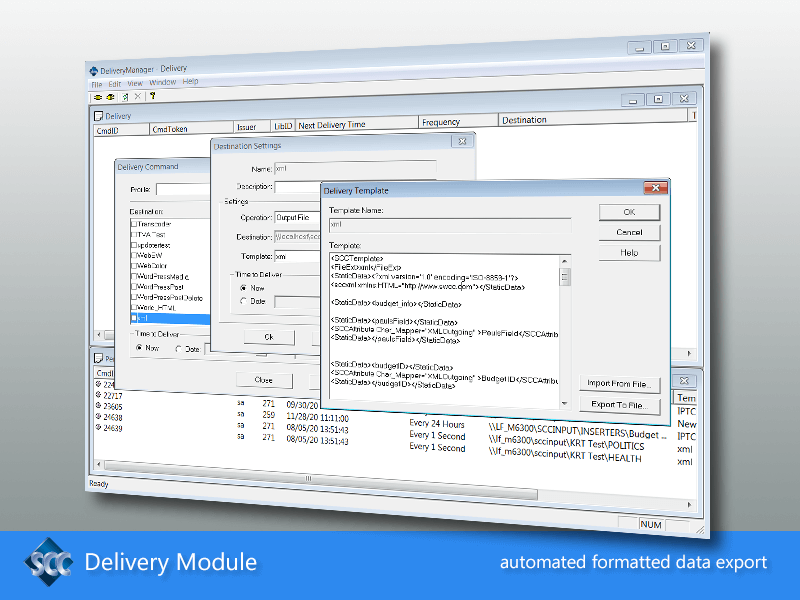
SCC Delivery Module allows documents stored inside an SCC digital asset management (DAM) system to be marked for automated delivery to one or more destinations.
Any number of destinations can be created or modified by the System Administrator while the system is operational. Destinations can also be added together as a commonly used "Profile" allowing easy selection of destinations in groups.
All movement of files, including high-resolution files, is performed server side and
not by the client. For example a delivery instruction to export one or more large files
can be issued in a matter of seconds from an SCC client application located anywhere in the world and for that file to be immediately copied by the server without any impact on client performance.
Each destination contains a choice of output location, for example to a folder on the network, to an FTP site or to an Email address. The destination also includes a date and time to send, either "Now" or at a predetermined time in the future e.g. "Today+1 @ 2:00 am". Finally the destination includes an output template containing a set of SCC defined commands and related parameters that control the format and content of the delivered file.
A typical use of the Delivery Module is for an SCC client application user to request delivery of a high resolution object such as a photo, graphic or video and for the server
to then send that object to a downstream content production/management system. The Delivery Module is also commonly used to automatically format and deliver published stories to news agencies such as Newsbank and Lexis-Nexis, and to deliver budget and assignment data to downstream systems.
Files can be marked for delivery either manually via an SCC client application, or scheduled to run automatically via a persistent command created within the SCC Delivery Manager utility.
The SCC Delivery Manager allows the creation of "persistent" delivery commands. These delivery commands monitor selected SCC libraries for files matching certain criteria, and if a match is made they are marked for automatic delivery to the destination configured within the command.
The SCC Delivery module incorporates "Done" and "Error" tables, which record the status of delivered files. These tables are purged according to custom preferences during SCC maintenance procedures. In addition a custom string can be added
to each sent record maintaining an audit trail of a files delivery history.
ServerOps Channel
The SCC Delivery Module enables the SCC MediaFactory ServerOps channel type, which performs real-time, user-scripted, server-side operations on objects contained in an SCC database. These operations can be performed immediately after insertion or modification, or can be scheduled to execute at any time of the day and on any days of the week.
A simple example of a ServerOps script is to detect when a database object has been added and immedately tag it by updating one of its metadata fields with a pre-determined value. A second example is to detect when an object has changed, read
its metadata, determine if a particular field now has a certain value and, if it does, copy the object's associated stored document (inserted file) to a destination folder while
updating different values into the metadata of the copied file and optionally the metadata of the object that remains behind in the database library.
The ServerOps Script Editor allows the sequencing of complex and powerful operations, such as AutoFill, Image Rotation, Object Linking, and File Copying. It supports conditional control flow, such as jumping within the script at execution time
depending upon the current value of a metadata field from an object, or jumping to a point in the script because an error was encountered while executing. Scripts support multiple metadata sets, for example a metadata set can be extracted from an object,
cloned to another set, and subsequently modified without affecting the original set. Scripts can check and set the value of text, date, and numeric variables, which can be used to modify attribute values or control the flow of the script.
ServerOps Scripts support parent-child relationships between objects. As a script is executing over one object (the parent) it can initiate the execution of another script over the set of objects that match the first object in a specific way (the children). For example, the children of an object might be all objects in the same or other MediaServer libraries that have a matching metadata field value. The parent script could start the execution of the child script which would then operate over each of those child objects and on completion the parent script would then continue.
